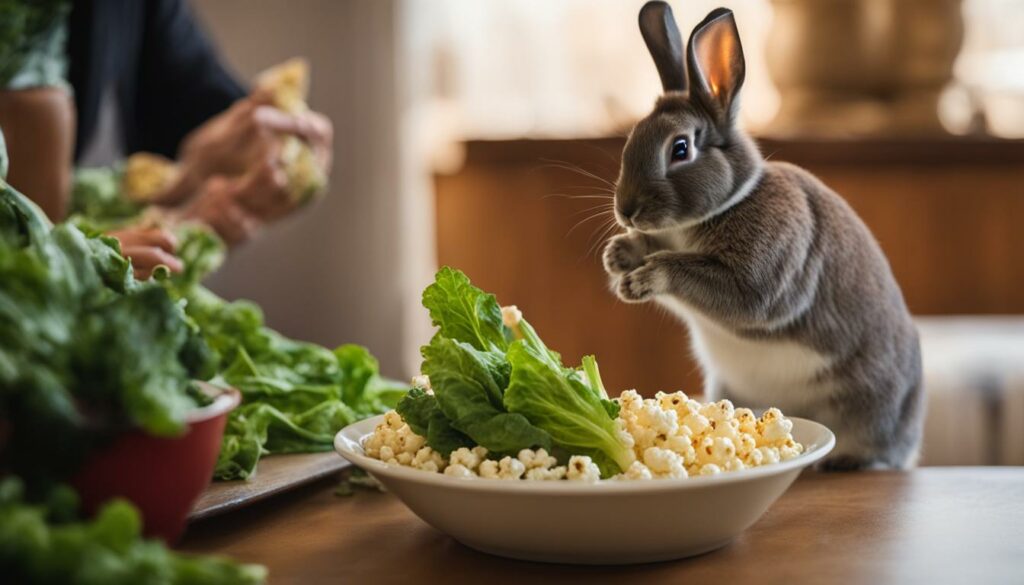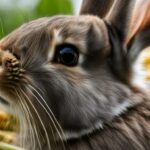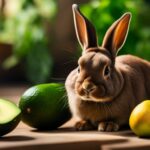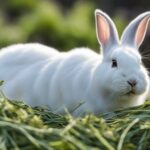Popcorn is a popular snack that many people enjoy, but can rabbits safely consume it? In this guide, we will explore the effects of feeding popcorn to rabbits and why it is not suitable for their diet. We will delve into the nutritional requirements of rabbits and the potential risks associated with feeding them popcorn.
When it comes to the diet of our furry friends, it’s important to understand what foods are safe and beneficial for them. While popcorn may seem harmless, it can actually pose several risks to rabbits. Let’s take a closer look at why popcorn should not be a part of their diet.
Key Takeaways:
- Popcorn is not suitable for rabbits due to its high carbohydrate, salt, sugar, and fat content.
- Feeding popcorn to rabbits can lead to digestive problems, obesity, and other health issues.
- Rabbits have specific nutritional requirements that should be met through a balanced diet.
- Offering safe and healthy treats, such as slices of cut-up fruit, is a better option for rabbits.
- Monitor your rabbit’s health and consult a veterinarian if any concerning symptoms arise.
Nutrition Comparison: Popcorn vs. Rabbit Daily Nutritional Requirements
When considering the suitability of popcorn for rabbits, it is essential to compare its nutritional composition with the daily requirements of these furry creatures. Popcorn is predominantly high in carbohydrates, sugars, salt, and fat, which can pose significant challenges to a rabbit’s delicate digestive system. Let’s take a closer look at the nutritional differences between popcorn and the essential dietary needs of rabbits.
Table 1 below provides a comprehensive nutritional comparison between popcorn per 100g and the recommended daily nutritional requirements for rabbits. The table highlights the excess of carbohydrates in popcorn and the essential fiber needed in a rabbit’s diet. While popcorn contains approximately 77g of carbohydrates, rabbits require a diet rich in fiber, typically around 25g per day.
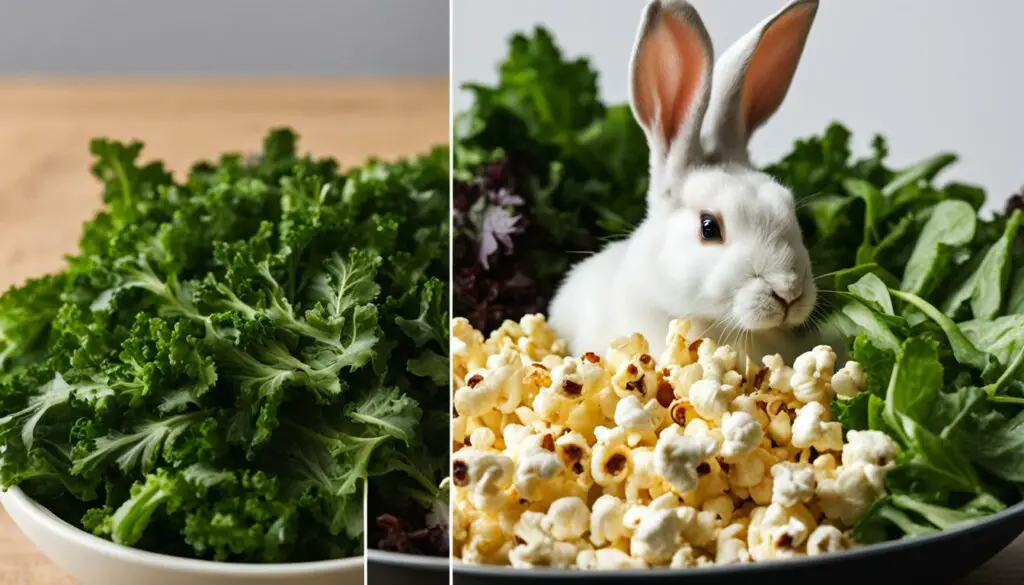
| Nutrient | Popcorn (per 100g) | Rabbit Daily Requirement |
|---|---|---|
| Carbohydrates | 77g | 25g |
| Fiber | 14g | 25g |
| Sugar | 0.9g | Less than 1g |
| Salt | 0.1g | Less than 0.5g |
| Fat | 4.5g | Less than 4g |
As shown in Table 1, the carbohydrate content in popcorn is significantly higher than what rabbits require. This emphasis on carbohydrates can contribute to digestive problems and negatively affect a rabbit’s overall health. On the other hand, rabbits thrive on a fiber-rich diet that aids in the proper functioning of their digestive system and maintains their overall well-being.
It is important to note that while popcorn may seem like a tempting snack option, its nutritional profile does not align with the specific dietary needs of rabbits. Instead, a rabbit’s diet should focus on providing the necessary fiber while limiting carbohydrates, sugars, salt, and fats. By prioritizing a balanced diet that includes high-quality hay, fresh water, rabbit nuggets, and suitable treats, rabbit owners can ensure the optimal health and happiness of their furry companions.
Why Popcorn is Bad for Rabbits
Feeding popcorn to rabbits may seem harmless, but it can have serious consequences for their health. The high carbohydrate content in popcorn can disrupt the delicate balance of a rabbit’s digestive system, leading to gastrointestinal stasis. This condition, also known as a “rabbit’s worst nightmare,” is characterized by a slowdown or complete halt of the movement of food through the gastrointestinal tract. It can cause bloating, pain, loss of appetite, and potentially life-threatening complications.
Rabbits have a fragile digestive system that is specifically adapted for a high-fiber diet. Popcorn, with its high carbohydrate, sugar, salt, and fat content, is far from a suitable food for rabbits. These components can wreak havoc on their digestive system and lead to severe gastrointestinal problems. It is crucial to understand the potential risks and avoid feeding popcorn to rabbits to ensure their well-being.
In addition to gastrointestinal stasis, popcorn kernels pose another danger to rabbits. The hard texture of unpopped kernels makes them extremely difficult for a rabbit’s intestines to break down and pass through. This can result in blockages and other serious health issues, including potential surgery and even death. It is vital to keep popcorn kernels out of reach of rabbits to prevent any accidental ingestion and potential harm.
| Health Risks of Feeding Popcorn to Rabbits: | Prevention and Alternatives: |
|---|---|
| Gastrointestinal stasis | Avoid feeding popcorn to rabbits |
| Blockages from popcorn kernels | Keep popcorn kernels away from rabbits |
| Severe digestive problems | Provide a balanced and appropriate diet |
| Potential surgical intervention | Offer safe treats such as fruits and vegetables |
| Possible fatality | Monitor rabbit’s health and consult a veterinarian if needed |
Feeding popcorn to rabbits is not worth the risks it poses to their health. It is essential to prioritize their dietary needs and provide them with a balanced and appropriate diet. Opt for safe treats such as sliced fruits or vegetables, which can be both enjoyable and nutritious for rabbits. By being mindful of their nutritional requirements and avoiding harmful foods like popcorn, we can ensure that rabbits live happy and healthy lives.
Dangers of Popcorn Kernels for Rabbits
Feeding popcorn kernels to rabbits can pose significant risks to their health. While popcorn itself is already unsuitable for rabbits due to its high carbohydrate and fat content, the potential dangers of popcorn kernels go even further.
Popcorn kernels are hard and indigestible for rabbits, which can lead to blockages in their digestive system. The difficult digestion of these kernels can cause discomfort, pain, and even life-threatening complications for rabbits. There have been reported cases of rabbits developing fatal problems due to the accumulation of unpopped kernels in their intestines.
To ensure the well-being of your rabbit, it is crucial to keep popcorn kernels away from them at all times. Make sure to properly dispose of any popcorn remnants, including unpopped kernels, to prevent accidental ingestion and potential harm to your furry friend.
| Dangers of Popcorn Kernels for Rabbits | Solutions |
|---|---|
| Hard and indigestible | Avoid feeding popcorn kernels to rabbits |
| Potential blockages in the digestive system | Ensure rabbits do not have access to popcorn kernels |
| Possible life-threatening complications | Properly dispose of any leftover popcorn kernels |
By understanding the dangers associated with popcorn kernels, we can better safeguard the health and well-being of our beloved rabbits. It is important to provide them with a diet that consists of suitable and nutritionally balanced foods, avoiding any potentially harmful treats or snacks.
Choking Hazards and Lack of Vomiting Reflex in Rabbits
Rabbits face unique challenges when it comes to their eating habits and digestive system. One particular concern is the risk of choking, especially with large and puffed up foods. Unlike humans, rabbits lack a vomiting reflex, which makes it difficult for them to expel any food that becomes lodged in their throat. This can lead to serious health complications and even be life-threatening for rabbits.
It is crucial to be aware of the choking hazards for rabbits and take necessary precautions to keep them safe. Foods like popcorn, which can be large in size and have a puffed texture, pose a significant risk. The risk is amplified when rabbits are given unrestricted access to these types of foods, increasing the likelihood of choking incidents.
As responsible rabbit owners, it is important to prioritize their safety and well-being. Avoid giving rabbits foods that are too large or puffed up, and always supervise them during snack time. By being mindful of their unique digestive system and the lack of a vomiting reflex, we can ensure that rabbits can enjoy their meals without the risk of choking.
Choking Hazards and Lack of Vomiting Reflex in Rabbits
Rabbits face unique challenges when it comes to their eating habits and digestive system. One particular concern is the risk of choking, especially with large and puffed up foods. Unlike humans, rabbits lack a vomiting reflex, which makes it difficult for them to expel any food that becomes lodged in their throat. This can lead to serious health complications and even be life-threatening for rabbits.
It is crucial to be aware of the choking hazards for rabbits and take necessary precautions to keep them safe. Foods like popcorn, which can be large in size and have a puffed texture, pose a significant risk. The risk is amplified when rabbits are given unrestricted access to these types of foods, increasing the likelihood of choking incidents.
As responsible rabbit owners, it is important to prioritize their safety and well-being. Avoid giving rabbits foods that are too large or puffed up, and always supervise them during snack time. By being mindful of their unique digestive system and the lack of a vomiting reflex, we can ensure that rabbits can enjoy their meals without the risk of choking.
Choking Hazards and Lack of Vomiting Reflex in Rabbits
Rabbits face unique challenges when it comes to their eating habits and digestive system. One particular concern is the risk of choking, especially with large and puffed up foods. Unlike humans, rabbits lack a vomiting reflex, which makes it difficult for them to expel any food that becomes lodged in their throat. This can lead to serious health complications and even be life-threatening for rabbits.
It is crucial to be aware of the choking hazards for rabbits and take necessary precautions to keep them safe. Foods like popcorn, which can be large in size and have a puffed texture, pose a significant risk. The risk is amplified when rabbits are given unrestricted access to these types of foods, increasing the likelihood of choking incidents.
As responsible rabbit owners, it is important to prioritize their safety and well-being. Avoid giving rabbits foods that are too large or puffed up, and always supervise them during snack time. By being mindful of their unique digestive system and the lack of a vomiting reflex, we can ensure that rabbits can enjoy their meals without the risk of choking.
Potential Health Issues from Feeding Popcorn to Rabbits
Feeding popcorn to rabbits can lead to a range of potential health issues, including obesity and digestive problems. The high fat and salt content in popcorn can contribute to weight gain in rabbits, making them more susceptible to obesity-related complications. Additionally, the carbohydrates in popcorn can disrupt a rabbit’s delicate digestive system, leading to digestive issues such as bloating, gas, and diarrhea. It is important to prioritize a balanced diet for rabbits, focusing on foods that provide the necessary nutrients without the potential risks associated with popcorn.
Obesity is a significant concern for rabbits, as it can lead to various health problems and a decreased quality of life. Excessive popcorn consumption, with its high fat content, can contribute to weight gain and obesity in rabbits. Obesity puts pressure on a rabbit’s joints and internal organs, increasing the risk of conditions such as arthritis and heart disease. Therefore, it is crucial to establish a proper diet for rabbits that promotes their overall health and prevents the development of obesity.
“Feeding popcorn to rabbits can have serious consequences for their health. The high fat and salt content in popcorn can lead to obesity and digestive problems, putting their well-being at risk.”
Additionally, the digestive problems that can arise from feeding popcorn to rabbits can be quite uncomfortable for them. The disruption of their digestive system can lead to symptoms such as bloating, gas, and diarrhea. These issues can cause discomfort and distress for rabbits, impacting their overall well-being. To avoid potential complications, it is essential to provide rabbits with a diet that is tailored to their specific nutritional needs and supports proper digestive function.
It is important to note that while popcorn should be avoided, there are plenty of other safe and healthy treat options for rabbits. Offering slices of cut-up fruits or vegetables, such as apple or carrot, can provide rabbits with enjoyable and nutritious snacks that align with their dietary requirements. By prioritizing a well-balanced diet and avoiding excessive popcorn consumption, we can help ensure the health and well-being of our furry friends.
| Potential Health Issues from Feeding Popcorn to Rabbits | Risks |
|---|---|
| Obesity | Weight gain, increased risk of arthritis and heart disease |
| Digestive Problems | Bloating, gas, diarrhea |
GI Stasis and its Impact on Rabbits
Gastrointestinal (GI) stasis is a common and serious condition that can affect rabbits, and it can be particularly triggered by an imbalanced diet. One of the potential culprits in causing GI stasis is the consumption of unsuitable foods like popcorn. When a rabbit’s digestive system slows or stops moving food through its gastrointestinal tract, it can lead to bloating, loss of appetite, and other distressing symptoms.
The key to managing GI stasis is early detection and prompt veterinary attention. It’s important for rabbit owners to be aware of the symptoms, which may include a decrease or absence of fecal pellets, reduced appetite, lethargy, and signs of discomfort such as teeth grinding or hunching. If any of these symptoms are observed, it is crucial to seek professional veterinary care immediately.
The treatment for GI stasis in rabbits typically involves a multi-faceted approach. This may include administration of medication to relieve pain and discomfort, as well as manual stimulation and hydration therapy to encourage movement in the GI tract. In severe cases, surgery may be required to remove blockages or repair any damage to the gastrointestinal system. However, prevention is always better than cure, and ensuring that rabbits are not exposed to unsuitable foods like popcorn can go a long way in reducing the risk of GI stasis.
| Symptoms of GI Stasis in Rabbits | Treatment for GI Stasis in Rabbits |
|---|---|
|
|
By understanding the risks of feeding unsuitable foods like popcorn to rabbits and being vigilant about their overall health, we can help prevent the development of GI stasis and ensure the well-being of our furry friends.
Pet Rabbit Treats and Alternatives to Popcorn
When it comes to treating your pet rabbit, it’s important to offer safe and suitable snacks that align with their dietary needs. While popcorn is not a recommended treat for rabbits, there are plenty of other options that can provide both enjoyment and nutrition. Consider adding these fruit and vegetable alternatives to your rabbit’s treat menu:
“Feeding your rabbit with the right treats is essential for their overall health and well-being.”
Fruit Treats:
- Apple Slices: Rich in fiber and low in calories, apple slices make a tasty and healthy treat for rabbits. Remember to remove the seeds and core before offering them to your furry friend.
- Banana: A small piece of banana can be a delightful snack for rabbits. It’s important to note that bananas are high in sugar, so moderation is key.
- Blueberries: These antioxidant-rich berries can be a fun and nutritious addition to your rabbit’s treat repertoire. Offer them in small quantities for a burst of flavor.
Vegetable Treats:
- Carrot Sticks: Carrots are a classic choice for rabbit treats. Cut them into sticks or small chunks for your rabbit to enjoy. Remember that carrots are high in sugar, so give them in moderation.
- Kale: This leafy green vegetable is packed with essential nutrients. Offer a small amount of kale as an occasional treat to provide variety in your rabbit’s diet.
- Cucumber Slices: Cool and refreshing, cucumber slices can be a hydrating treat for rabbits. Ensure that the slices are cut into small, manageable pieces.
Remember to introduce new treats gradually and monitor your rabbit’s reactions. Every rabbit is unique, and individual preferences and sensitivities may vary. Offering a balanced and varied diet, along with suitable treats, ensures your rabbit’s well-being and happiness.
| Treat | Benefits |
|---|---|
| Apple Slices | Rich in fiber and low in calories. |
| Banana | A small piece can provide a burst of flavor. |
| Blueberries | Antioxidant-rich and a fun addition to the treat menu. |
| Carrot Sticks | A classic choice, packed with nutrients. |
| Kale | Provides variety and essential nutrients. |
| Cucumber Slices | Cool, refreshing, and hydrating. |

Monitoring Rabbit’s Health After Eating Popcorn
If your rabbit accidentally consumes a small amount of popcorn, there is generally no immediate cause for concern. However, it is essential to closely monitor their health and behavior over the next 24 hours. Pay attention to their eating habits, movement, and bathroom patterns to ensure they are not experiencing any adverse effects from the popcorn consumption.
While rabbits have delicate digestive systems, a small amount of popcorn is unlikely to cause severe harm. However, it is crucial to be vigilant for any signs of digestive issues. Keep an eye out for symptoms such as decreased appetite, changes in stool consistency, or abdominal discomfort. If your rabbit shows any concerning symptoms, it is advisable to consult a veterinarian for further guidance.
Remember, every rabbit is unique, and their tolerance to certain foods may vary. Even if your rabbit has consumed popcorn without any immediately noticeable effects, it is still important to be cautious. Always prioritize your rabbit’s well-being and follow a diet that aligns with their nutritional requirements to ensure a healthy and happy life for your furry friend.
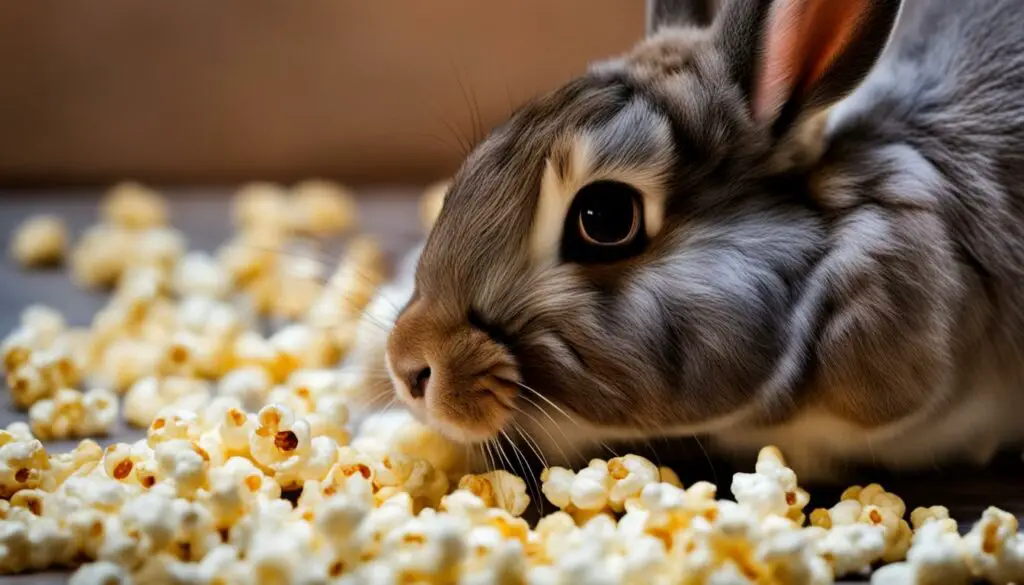
Signs of Digestive Issues in Rabbits
When monitoring your rabbit’s health after eating popcorn or any other food, it is crucial to be aware of the signs of digestive issues. Some common signs include:
- Decreased appetite or refusal to eat
- Changes in stool consistency (diarrhea or smaller, darker droppings)
- Abdominal discomfort or bloating
- Decreased activity or lethargy
- Unusual behaviors, such as excessive grooming or hiding
If you notice any of these symptoms or any other concerning changes in your rabbit’s health or behavior, it is best to consult a veterinarian. They can provide a proper diagnosis and recommend appropriate treatment if necessary.
Remember, prevention is always better than cure. By avoiding feeding your rabbit popcorn and other unsuitable foods, you can help maintain their digestive health and overall well-being.
Dangers of Chocolate and Popcorn for Rabbits
While it is well-known that rabbits should not be fed popcorn, it is equally important to understand the dangers of combining popcorn with chocolate. Chocolate is toxic to rabbits, and when combined with popcorn, it becomes potentially hazardous for these furry friends. Consumption of chocolate can lead to chocolate poisoning in rabbits, causing various symptoms and requiring immediate veterinary attention.
Rabbits lack the ability to metabolize theobromine, a substance found in chocolate, which can be toxic to their system. Even a small amount of chocolate can have severe consequences for rabbits, including muscle tremors, rapid breathing, increased heart rate, and even death. It is vital to keep all chocolate products, including chocolate sauce on popcorn, well out of reach from rabbits to ensure their safety and well-being.
“Chocolate is toxic to rabbits, and when combined with popcorn, it becomes potentially hazardous for these furry friends.”
Rabbit owners must remain vigilant and educate themselves on the potential harm caused by chocolate and popcorn. Supervision is key when treating rabbits, and it is crucial to provide them with suitable and safe snacks that align with their dietary needs. By prioritizing their health and well-being, we can ensure a long, happy life for these beloved pets.
| Chocolate | Popcorn |
|---|---|
| Toxic to rabbits | Unsuitable for rabbit diet |
| Can cause chocolate poisoning | Can lead to digestive problems |
| Requires immediate veterinary attention if ingested | Potential choking hazards for rabbits |
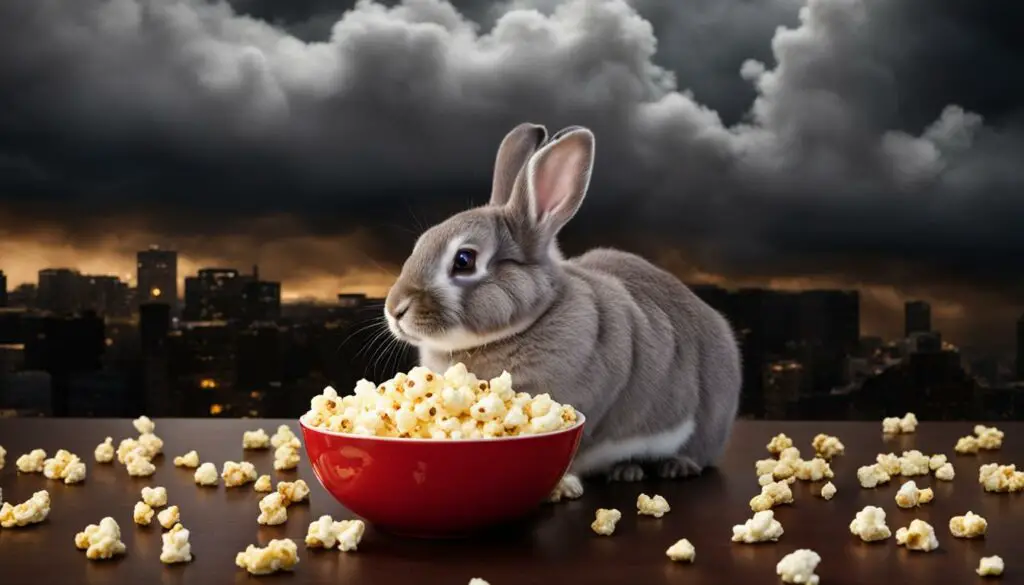
Proper Diet for Rabbits
When it comes to rabbits’ dietary needs, a balanced and appropriate diet is essential for their overall health and well-being. The following are key elements to consider:
Rabbit Diet
A rabbit’s diet should primarily consist of hay, preferably Timothy hay, as it provides essential nutrients and promotes proper digestion. The high fiber content in hay helps maintain healthy gastrointestinal function in rabbits and prevents dental problems by naturally wearing down their teeth.
Fresh Water for Rabbits
Alongside hay, fresh water should always be available to rabbits. Clean drinking water is essential for rabbits to stay hydrated and maintain proper bodily functions. Regularly check and refill their water supply to ensure they have access to clean, fresh water at all times.
Appropriate Portion Sizes for Rabbits
Feeding the right portion sizes is crucial to prevent obesity and ensure proper nutrition for rabbits. It’s important to provide the recommended daily amount of rabbit nuggets, which are specifically formulated to meet their nutritional needs. Additionally, offer a variety of fresh greens such as kale, parsley, and dandelion leaves, but be mindful of portion sizes to avoid overfeeding and digestive issues.
| Food | Portion Size |
|---|---|
| Rabbit Nuggets | 1/4 to 1/2 cup per day |
| Fresh Greens | 1 to 2 cups per day |
| Treats | Occasional small portions (e.g., 1-2 slices of apple or banana) |
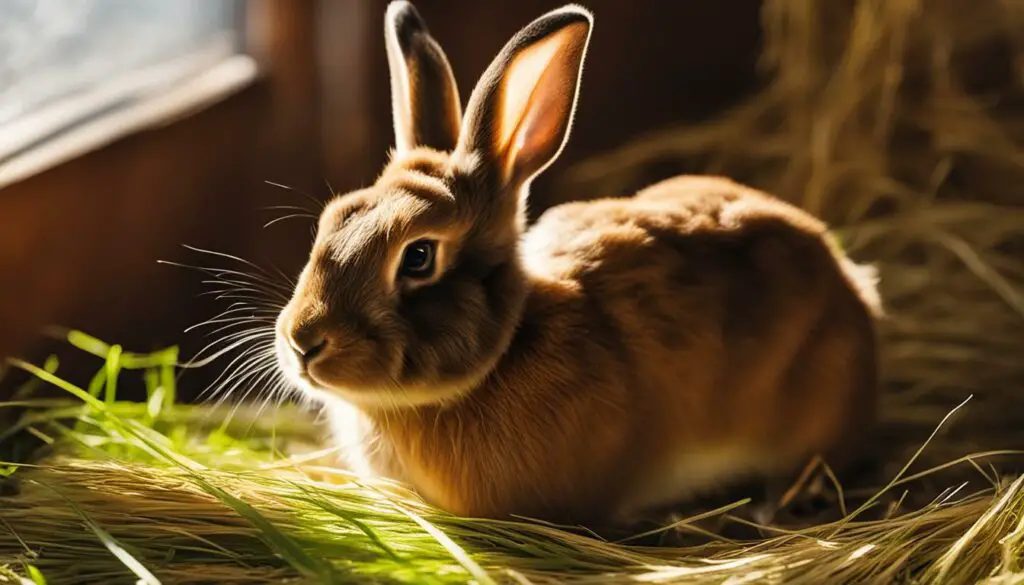
By prioritizing a proper diet consisting of hay, fresh water, appropriate portion sizes of rabbit nuggets, and occasional treats, we can ensure the well-being and longevity of our furry friends.
The Importance of Dental Health for Rabbits
When it comes to the overall well-being of rabbits, dental health plays a crucial role. A rabbit’s teeth are continuously growing, and proper dental care is essential to prevent dental problems that can affect their ability to eat and lead to serious health issues. The impact of diet on rabbit teeth cannot be underestimated.
Hay is a key component in maintaining healthy rabbit teeth. Chewing on hay helps wear down their constantly growing teeth, preventing overgrowth and the formation of painful spurs. The fibrous texture of hay stimulates their jaw and promotes natural tooth grinding, keeping their teeth properly aligned. It is recommended to provide rabbits with unlimited access to fresh, good quality hay to ensure their dental health.
The fibrous texture of hay stimulates their jaw and promotes natural tooth grinding, keeping their teeth properly aligned.
In addition to hay, a balanced diet that includes appropriate portion sizes of rabbit nuggets and fresh greens also contributes to maintaining healthy teeth. These foods provide essential nutrients and promote proper dental development and function. However, it is crucial to avoid excessive consumption of sugary treats and foods high in carbohydrates, as they can contribute to dental problems in rabbits.
The Impact of Diet on Rabbit Teeth
The impact of diet on rabbit teeth cannot be overlooked. A diet that lacks adequate hay or contains an excessive amount of soft, processed foods can lead to dental issues. Without proper wear from chewing on fibrous materials, a rabbit’s teeth can become overgrown, leading to difficulty in eating, weight loss, and potential dental abscesses.
It is important to understand that a rabbit’s teeth are continuously growing throughout their life. This is because their teeth undergo natural attrition, meaning they wear down as the rabbits chew. The constant chewing and grinding against fibrous materials like hay play a vital role in maintaining the proper length and alignment of their teeth.
Therefore, by providing a diet rich in hay and appropriate portion sizes of rabbit nuggets and fresh greens, rabbit owners can ensure that their pets have healthy teeth. A proper diet promotes proper tooth wear and supports overall dental health in rabbits.
| Dietary Recommendations for Rabbit Dental Health |
|---|
| Unlimited access to fresh, high-quality hay |
| Appropriate portion sizes of rabbit nuggets |
| Regular inclusion of fresh greens in their diet |
| Avoidance of excessive sugary treats and foods high in carbohydrates |
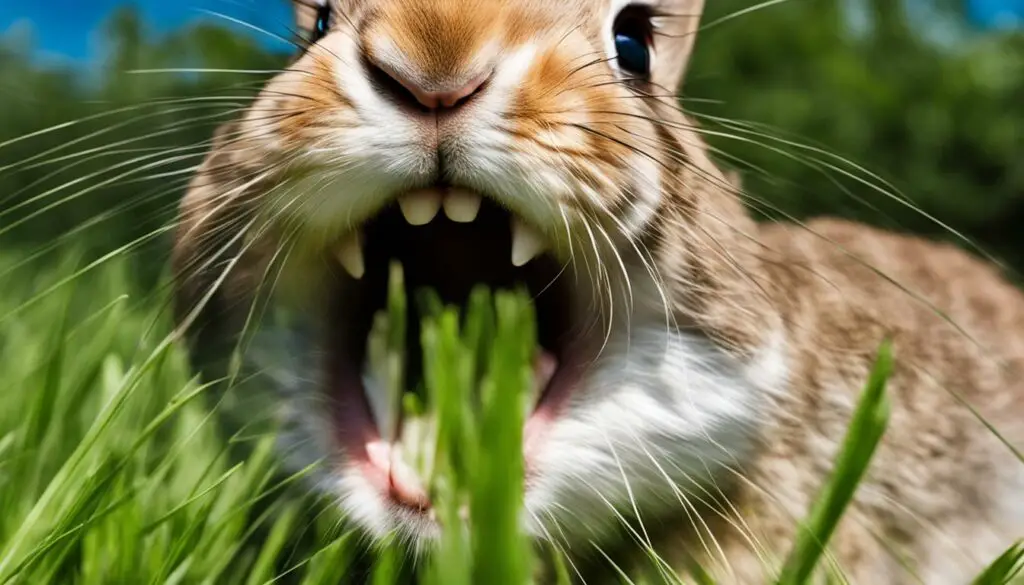
The Risks of Homemade Popcorn for Rabbits
While homemade popcorn may seem like a healthier alternative for rabbits compared to commercially available options, it still presents risks and is not suitable for their dietary needs. Homemade popcorn typically involves minimal ingredients, such as popcorn kernels and cooking oil, without additives like salt or sugar. However, rabbits have delicate digestive systems, and even plain homemade popcorn can pose dangers to their health.
One of the primary concerns with homemade popcorn is its indigestibility for rabbits. The hard kernels can be challenging for a rabbit’s intestines to break down, increasing the risk of blockages and other gastrointestinal issues. These complications can be life-threatening and require immediate veterinary attention. It is crucial to avoid feeding rabbits any type of popcorn, including homemade varieties, to prevent potential harm.
When it comes to treating rabbits, there are various healthy alternatives to popcorn. Slices of cut-up fruit like apples or bananas can serve as enjoyable and nutritious snacks. It is important to remember that treats should be given in moderation and aligned with a rabbit’s dietary needs. Avoiding foods high in carbohydrates, sugars, salt, and fats is key to promoting a rabbit’s overall well-being.
| Potential Risks of Homemade Popcorn for Rabbits | Healthy Popcorn Alternatives for Rabbits |
|---|---|
| Indigestibility due to hard kernels | Slices of apples or bananas |
| Possible blockages and gastrointestinal issues | Carrot sticks or cucumber slices |
| Life-threatening complications | Leafy greens like kale or spinach |
It is essential to prioritize the well-being of rabbits by providing them with suitable and safe treats. While homemade popcorn may appear harmless, its indigestibility and potential impact on a rabbit’s health make it an unsuitable choice. By exploring other natural and healthy options, such as sliced fruits and vegetables, we can ensure that rabbits receive enjoyable and nutritious snacks that contribute to their overall well-being.

Treating Rabbits in Moderation: Ensuring a Safe Popcorn Portion
When it comes to treating rabbits, it’s important to do so in moderation and with careful supervision. While popcorn may seem like a tempting snack, it is not suitable for rabbits due to its high carbohydrate, salt, sugar, and fat content. However, if you choose to treat your furry friend with a small portion of popcorn, there are a few key considerations to keep in mind.
Firstly, it is crucial to ensure that the popcorn provided to your rabbit is free from harmful additives such as salt, sugar, or butter. Popcorn should be plain and air-popped, without any seasonings or flavorings. Additionally, avoid giving your rabbit large amounts of popcorn, as overconsumption can lead to digestive issues and potential weight gain.
Supervision is essential during your rabbit’s snack time to prevent any choking hazards. Unlike humans, rabbits do not have a vomiting reflex, making it difficult for them to expel any food that becomes lodged in their throat. Always be present when your rabbit is enjoying their popcorn treat, ensuring they are taking small bites and not rushing through their snack.
| Table: Safe Popcorn Portion for Rabbits | |
|---|---|
| Rabbit Weight | Safe Popcorn Portion |
| 1 pound (0.45 kg) | 1 to 2 popcorn kernels |
| 2 pounds (0.9 kg) | 2 to 4 popcorn kernels |
| 3 pounds (1.4 kg) | 3 to 6 popcorn kernels |
| 4 pounds (1.8 kg) | 4 to 8 popcorn kernels |
| 5 pounds (2.3 kg) | 5 to 10 popcorn kernels |
Remember, the provided portion sizes in the table are general guidelines based on rabbit weight. It’s important to consult with your veterinarian, who can provide personalized advice based on your rabbit’s specific needs and health condition.
While it’s understandable to want to treat your rabbit with popcorn, it’s crucial to prioritize their overall health and well-being. There are plenty of safe and enjoyable alternatives to popcorn that can be offered to rabbits as treats. Slices of cut-up fruit, such as apple or banana, can provide a healthy and nutritious option for your furry friend.
By treating rabbits in moderation, ensuring a safe popcorn portion, and supervising their snack time, you can show your love and care for your rabbit while keeping their dietary needs in mind.
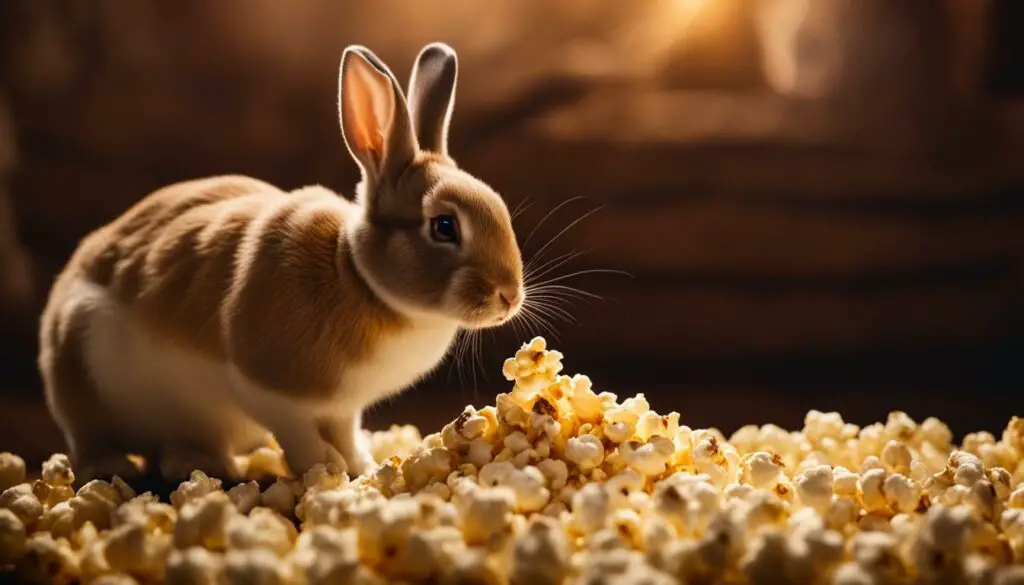
Conclusion
In conclusion, it is not safe to feed popcorn to rabbits. While popcorn may be a popular snack for humans, it is not suitable for the delicate digestive systems of rabbits. The high carbohydrate, salt, sugar, and fat content in popcorn can disrupt the balance of a rabbit’s digestive system, leading to potential health issues such as gastrointestinal stasis and obesity.
Instead of feeding popcorn to rabbits, it is important to provide them with a balanced diet that fulfills their nutritional requirements. This diet should primarily consist of hay, fresh water, and appropriate portions of rabbit nuggets and greens. It is also crucial to offer treats in moderation and opt for safe alternatives such as slices of cut-up fruit.
By prioritizing a rabbit’s dietary needs and avoiding harmful foods like popcorn, we can ensure their overall well-being and prevent any potential complications. Remember to monitor your rabbit’s health and consult a veterinarian if any concerning symptoms arise. With the right care, love, and attention, we can provide our furry friends with a healthy and happy life.
FAQ
Can rabbits eat popcorn?
No, popcorn is not suitable for a rabbit’s diet due to its high carbohydrate, sugar, salt, and fat content.
Why is popcorn bad for rabbits?
Popcorn can cause serious digestive problems in rabbits, including gastrointestinal stasis, which can be life-threatening.
What are the dangers of popcorn kernels for rabbits?
Popcorn kernels are extremely difficult for a rabbit’s intestines to digest and can lead to blockages and other serious health issues.
Can popcorn pose choking hazards for rabbits?
Yes, the size and puffiness of popcorn can present choking hazards for rabbits, who do not have a vomiting reflex.
What potential health issues can arise from feeding popcorn to rabbits?
Feeding popcorn to rabbits can lead to obesity and digestive problems due to its high fat and salt content.
What is GI stasis and how does it relate to popcorn consumption?
GI stasis is a serious condition in rabbits that can be triggered by an imbalanced diet, including the consumption of unsuitable foods like popcorn.
What are some safe alternatives to popcorn as treats for rabbits?
Slices of cut-up fruit, such as apple or banana, can be healthy and enjoyable treats for rabbits.
What should I do if my rabbit accidentally eats popcorn?
Monitor your rabbit’s health and behavior over the next 24 hours and consult a veterinarian if any concerning symptoms arise.
Is chocolate safe for rabbits?
No, chocolate is toxic to rabbits and should be kept away from them at all times.
What should a rabbit’s diet primarily consist of?
A rabbit’s diet should primarily consist of hay, fresh water, rabbit nuggets, and appropriate treats.
How does a rabbit’s diet affect its dental health?
Chewing on hay helps maintain a rabbit’s dental health by preventing overgrowth and dental problems.
Can rabbits consume homemade popcorn?
While homemade popcorn may be less harmful, it is still not suitable for rabbits due to its indigestibility and potential impact on their health.
How should I treat my rabbit with popcorn?
If you choose to treat your rabbit with popcorn, do so in moderation and under constant supervision, ensuring it is free from harmful additives.

